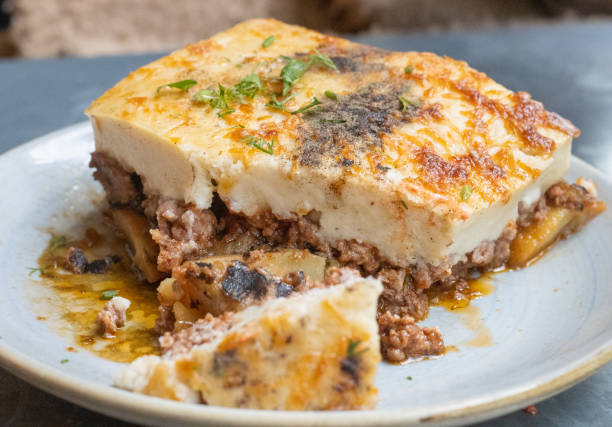Moussaka is a traditional dish enjoyed in many Mediterranean and Middle Eastern countries, particularly in Greece. This layered casserole typically consists of eggplant (or sometimes potatoes), ground meat, a rich tomato sauce, and a creamy béchamel topping. Moussaka is celebrated for its complex flavors and hearty texture, and it also offers a variety of nutritional benefits. This write up explores the nutritional value of moussaka and why it can be a valuable addition to a balanced diet.

The base layer of moussaka often includes eggplant, a low-calorie vegetable that provides a moderate amount of carbohydrates. Eggplant is also rich in fiber, which aids in digestion, helps regulate blood sugar levels, and promotes satiety. Some variations of moussaka use potatoes instead of or in addition to eggplant. Potatoes are a good source of complex carbohydrates, providing a steady supply of energy, as well as fiber, especially when the skins are left on.

It is an eggplant- or potato-based dish and very similar to Shepherd’s pie.
The middle layer of moussaka usually consists of ground meat, such as lamb or beef, which is a significant source of high-quality protein. Protein is essential for muscle repair and growth, immune function, and the production of enzymes and hormones. Including meat in moussaka ensures that the dish provides a complete set of amino acids necessary for various bodily functions. For those looking for a lighter or vegetarian option, ground turkey or plant-based proteins like lentils can be used, offering a leaner source of protein with less saturated fat.

Moussaka is rich in a variety of vitamins and minerals, thanks to its diverse ingredients. Eggplants provide vitamins A, C, and K, as well as important phytonutrients like nasunin, which has antioxidant properties. Tomatoes, used in the meat sauce, are an excellent source of vitamin C and lycopene, an antioxidant linked to reduced risk of chronic diseases, including heart disease and cancer. Additionally, the meat provides essential minerals such as iron and zinc. Iron is crucial for oxygen transport in the blood, while zinc supports immune function and wound healing.

The béchamel sauce that tops moussaka is typically made with butter, flour, and milk. While butter and milk contain saturated fats, they also provide important nutrients. Whole milk is a good source of calcium, necessary for bone health, and vitamin D, which aids calcium absorption. Using olive oil instead of butter in the béchamel can introduce healthier monounsaturated fats, which are beneficial for heart health and can help reduce bad cholesterol levels.

The vegetables in moussaka, particularly eggplant and tomatoes, contribute a significant amount of dietary fiber. Fiber is crucial for maintaining healthy digestion, preventing constipation, and promoting a feeling of fullness. This can help with weight management and reduce the risk of developing chronic conditions such as heart disease and type 2 diabetes.
The ingredients in moussaka, especially eggplant and tomatoes, are rich in antioxidants. Antioxidants help neutralize harmful free radicals in the body, reducing oxidative stress and inflammation. This can lower the risk of chronic diseases and improve overall health. The garlic and onions often used in the meat sauce also have anti-inflammatory and antimicrobial properties, further enhancing the dish’s health benefits.

Moussaka is a flavorful and nutritious dish that offers a range of health benefits. Its combination of protein-rich meat, fiber-packed vegetables, and a creamy béchamel sauce provides a balanced mix of macronutrients and essential vitamins and minerals. By incorporating a variety of ingredients, moussaka can be part of a well-rounded diet that supports muscle health, energy production, and overall well-being. While it is a rich and hearty dish, making mindful choices, such as using leaner meats or whole-grain flour in the béchamel, can enhance its nutritional profile. Enjoyed in moderation and as part of a balanced diet, moussaka is a delicious way to experience the culinary traditions of the Mediterranean and Middle Eastern regions while reaping numerous nutritional benefits.





Great breakdown! For those diving into AI-optimized workflows, checking out the AI Customer Service Assistant tools on tyy.AI can really level up efficiency.